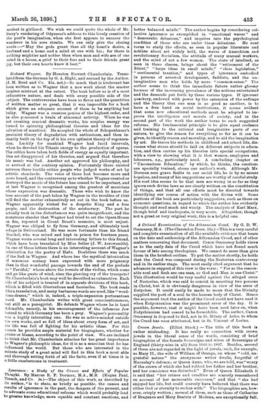ignorance : a Study of the Causes and Effects of
Popular Th.:nest. By Marcus R P. Dorman, M.A., M.B. (Kegan Paul, Trench, and Co. as.)—The object of this work, as described by its author, "is to state, as briefly as possible, the causes and results of ignorance in the past, the dangers of the present, and to advocate some educational reforms which would probably lead to greater knowledge, more equable and constant emotions, and better balanced minds." The author begins by considering col- lective ignorance as exemplified in "emotional waves" and "democratic delusions," and inquires into the psychological condition of those who are under these delusions. He next turns to study the effects, as seen in popular literature and notiiine about art widely held, the waves of Anarchism and revolutionary Socialism, the attitude of many manual workers, and the mind of not a few women. The state of intellect, as seen in these classes, brings about the "retirement of the fittest," "large ideas in small minds," "class legislation," "sentimental taxation," and types of ignorance embodied in persons of arrested development, faddists, and the un- imaginative man who holds by mere "common-sense." The author seems to think the immediate future rather gloomy because of the increasing prevalence of the notions entertained and the demands put forth by these various types. If ignorant quackery, endowed with power by the extension of the suffrage and the theory that one man is as good as another, is to have a free hand on social institutions, it seems evident that some new educational methods must be adopted to im- prove the intelligence and morale of society, and in the second part of the work the author turns to such suggested reforms. His fundamental principle is to give equal credence and training to the rational and imaginative parts of our nature, to give the reason for everything so far as it can be given, to identify reason and morality, and to aid the imagination by art. He traces his methods in childhood and school life, dis- cusses what stress should be laid on different subjects in educa- tion, and then carries up his theories into special occupations, with a view to showing what it is that women, employers and labourers, e.g., particularly need. A concluding chapter on "Unconscious Education," by which, he thinks, the emotions are specially trained, closes our author's work. Although Mr. Dorman sees grave faults in our social life, he is by no means hopeless, and many of his suggestions are worthy of careful study. His root idea seems to be that men are wrong in so far as they ignore such divine laws as are clearly written on the constitution of things, and that all our efforts must be directed towards identifying our course of action with the divine will. Some portions of the book are particularly suggestive, such as those on economic questions, in regard to which the author has evidently thought and read much and wisely. The analysis of Karl Marx, though brief and inadequate, is very acute. Altogether, though not a great or very original work, this is a helpful one.






































 Previous page
Previous page